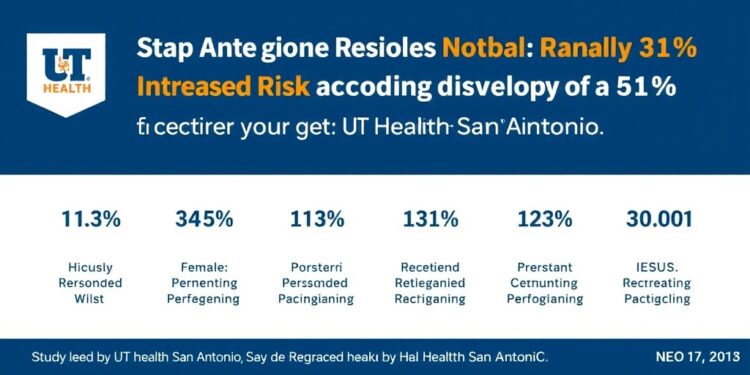
Females appear to face a significantly heightened risk of developing long COVID, with a recent study revealing that they carry a 31% increased risk compared to males. This research, spearheaded by The University of Texas Health Science Center at San Antonio (UT Health San Antonio) and funded by the National Institutes of Health (NIH), offers critical insights into the gender disparities present in the aftermath of COVID-19. Notably, women in the age bracket of 40 to 55 years were identified as having the highest chances of experiencing long COVID symptoms. This study was conducted under the RECOVER initiative, a large-scale NIH-funded project aimed at understanding the long-term health implications of COVID-19.
In the examination of over 12,000 participants, the researchers carefully assessed various demographic and health-related factors to arrive at their conclusions regarding the risks associated with long COVID. The overarching national initiative, RECOVER, is focused on exploring the lingering effects of COVID-19, and the recent findings highlight a troubling trend—females are at a higher risk for extended illness after initial infection. This comprehensive study asserts that the increased risk among women remains significant even when accounting for various controllable factors including race, ethnicity, COVID strain, initial infection severity, and non-medical social influences that often alter health trajectories.
The study elaborates on the various determinants that may influence the risk of developing long COVID in females, suggesting that age, pregnancy status, and menopausal state play crucial roles. It firmly establishes that healthcare professionals should be aware of these significant differences when assessing, diagnosing, and treating long COVID in their patients. Dr. Dimpy Shah, the assistant professor leading the research, emphasized the implications of these findings. They not only call for tailored medical approaches to treat long COVID but also serve as a wake-up call regarding the broader health disparities that exist between genders.
In discussing long COVID’s implications, the study sheds light on the unique challenges females face post-infection. While prior research indicated that males have historically faced more severe acute cases and higher mortality due to COVID-19, this new study presents a different narrative for long COVID. As it stands, a notable portion of females appears to contend with persistent and often debilitating symptoms that can last long after the initial COVID-19 infection has resolved.
Moreover, the study addresses concerns regarding the methodologies of past research on long COVID, pointing out that many earlier studies had limitations, such as small sample sizes, lack of ethnic diversity, and failure to account for critical factors like comorbidities, vaccination statuses, and variations in the COVID virus that individuals were exposed to. The RECOVER team’s robust analysis aims to fill these gaps by presenting a thorough evaluation of sex differences regarding long COVID.
Additionally, the study utilized a longitudinal methodology to track health outcomes over time amongst a diverse group of participants recruited from numerous locations. By examining individuals who had been infected with SARS-CoV-2, the study expertly detailed the frequency and severity of long COVID symptoms reported by females versus males. The research’s attention to socio-demographic information presents a more nuanced view of how health is affected by multiple intersecting factors.
Intriguingly, while the findings reveal that females face a heightened risk of long COVID, they also underscore an important area for future inquiry. Researchers, including Dr. Shah, have expressed a desire for further exploration into the biological, social, and behavioral reasons for the heightened risk female patients face. Their work encourages additional studies to disentangle the complex web of effects leading to these gender disparities in long COVID experiences.
The significant implications of this research extend beyond the individual. They point towards a collective need for policy-level changes in how health care is delivered to diverse populations, particularly as healthcare systems continue to navigate the long-lasting impacts of the COVID-19 pandemic. Understanding these psychological and physiological differences will be essential as public health strategies evolve to address the ongoing consequences of this virus.
This influential study also highlights that while many individuals experience resolutions to acute COVID-19, attention must be pivoted to those who do not. Chronic health complications require targeted assistance and understanding. The gender differences delineated in this research prompt healthcare practitioners to re-evaluate their approaches to long COVID, ensuring they consider sex differences as essential components when developing treatment and follow-up plans.
As the ramifications of COVID-19 continue to unfold globally, this research provides significant insights into the nuances of recovery, particularly concerning female patients. The findings from this large cohort study underscore the essential need to prioritize research on long COVID and its impacts moving forward. Enhanced understanding of how gender influences health outcomes will be invaluable in devising methods of prevention and treatment for this shared, yet uniquely experienced condition.
In conclusion, the study prominently positions the heightened risk of long COVID in females as a public health concern that must be addressed with urgency. By informing medical practice with detailed sex-specific data, the research paves the way for more individualized healthcare interventions tailored to the distinct experiences of male and female patients dealing with long COVID. As more research emerges, it will be crucial to maintain this focus on gender and health, ensuring equitable treatment for all patients in the long shadow of COVID-19.
Subject of Research: Long COVID and its effects on Different Sexes
Article Title: Sex Differences in Long COVID
News Publication Date: January 22, 2025
Web References: www.recovercovid.org
References: DOI: 10.1001/jamanetworkopen.2024.55430
Image Credits: JAMA Network Open
Keywords: Long COVID, gender differences, public health, chronic illness, epidemiology, infectious diseases, SARS-CoV-2, post-viral syndromes.





